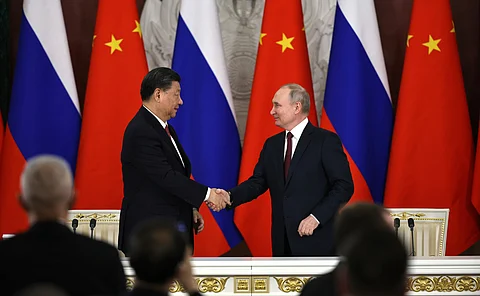

The head of Ukraine’s Foreign Intelligence Service (SVR), Oleh Ivashchenko, has accused China of supplying Russia with military-related materials, including special chemicals, gunpowder, and critical drone components. The allegations were made in a partially released interview on Sunday.
According to Ivashchenko, over 20 Russian factories linked to the country’s military-industrial complex are receiving materials from China. He also claimed that more than 80% of the critical electronic components used in Russian drones as of this year are of Chinese origin.
The remarks follow a pattern of escalating public accusations from Ukraine against Beijing in recent months. In early April, two Chinese nationals were captured fighting alongside Russian forces. While Ukrainian officials acknowledged the individuals had joined the Russian military independently and were not operating under orders from Beijing, the incident prompted Ukrainian President Volodymyr Zelensky to publicly highlight the issue. It also led to diplomatic fallout, with Ukraine summoning China’s ambassador and Washington issuing strong condemnations.
On April 17, Zelensky formally accused China for the first time of providing weapons and military materials to Russia. Days later, Kiev presented what it claimed was evidence to Chinese Ambassador Ma Shengkun. Beijing rejected the accusations, maintaining its public position of neutrality and urging peace through negotiations.
Since the launch of Russia’s “Special Military Operation” in February 2022, Moscow and Beijing have significantly deepened their relationship. Although China has consistently called for a political solution and distanced itself from direct involvement, the West has grown increasingly skeptical of its role.
Tensions escalated further in April 2023 when Zelensky held a phone call with Chinese President Xi Jinping, a move that reportedly caused concern among Ukraine’s Western allies. However, following Zelensky’s renewed accusations last month, China appears to have adopted a slightly harder rhetorical tone.
During Xi’s recent visit to Moscow for the May 9 Victory Day celebrations, he signed a joint statement with Russian President Vladimir Putin. The statement called for addressing the “root causes” of the war—language often used by Russia to suggest a negotiated settlement that meets its terms, rather than an unconditional ceasefire.
Ukraine’s intensifying criticism of China also coincides with the re-escalation of U.S.-China tensions. On April 2, President Donald Trump imposed new tariffs on China, reigniting a trade war. Some observers believe that Zelensky’s timing may be strategic, aiming to align Ukraine more closely with Washington’s hardline stance on Beijing as the Trump administration increasingly identifies China as its top geopolitical rival.